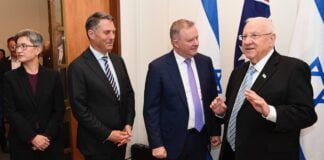The Liberals have held on to government in NSW, winning a narrow majority in parliament after Labor slumped following a disastrous final week of the campaign for Labor’s Michael Daley.
The election was expected to be close, but Labor managed to win just two seats and saw its primary vote go slightly backwards.
But there is little solace for Scott Morrison in the result. The federal election looks likely to be decided in Queensland and Victoria where the Liberals are facing a rout. Polling has shown that even the blue ribbon Liberal seat of Goldstein in Melbourne in under threat.
And the dramatic loses for the National Party in NSW are a further headache for the Coalition.
There were swings of around 20 per cent against the Nationals in five seats across western NSW.
The Shooters, Farmers and Fishers Party took the seats of Barwon, Murray and Orange on the back of campaigns against the Nationals’ failure to deliver local services and jobs.
These areas have been hit hard by the drought, as well as the failure of the Murray-Darling River plan which has seen the rivers dry up downstream, leaving towns in NSW reliant on unsafe bore water supplies.
The problems for the Nationals will lead to further divisions and infighting in the Coalition.
On the night of the NSW election Barnaby Joyce was already calling for “a different message in regional areas” and he has joined other Nationals in demanding a new coal power station in Queensland.
Why Labor failed
Labor in NSW remains tarred by the corruption that saw its vote savaged in 2011. Former minister Ian MacDonald was only released from prison in February.
NSW Labor’s Michael Daley was elected leader just 134 days before the election following Luke Foley’s dumping over a sexual assault scandal.
Although largely unknown, Daley was a Minister during the last Labor government and was hardly a sharp break from the past.
Labor announced policies including more nurses and better nurse to patient ratios in hospitals, increased funding for TAFE and a 50 per cent renewable energy plan. Their call to fund schools and hospitals not stadiums cut through during the campaign, after Daley announced on air with shock-jock Alan Jones that he would sack him along with the rest of the SCG board.
But Labor was unable to create a compelling sense it offered an alternative. Daley’s stumbles in the final TV debate over policy details hardly inspired confidence.
And Daley’s racist claim that Asian migrants were “taking the jobs” of young Australians cost Labor dearly—however hypocritical it was to see the Liberals condemning racism.
Labor suffered swings against it in seats like Oatley and Kogarah, with large Chinese-Australian populations. And Daley was exposed as just another grubby politician.
The Greens managed to hold their three lower house seats in Newtown, Balmain and Ballina, increasing their support there, despite a decline of around 1 per cent in their overall vote across the state.
David Shoebridge and Abigail Boyd both won seats in the upper house.
Former Greens MP Jeremy Buckingham, who quit the party to run as an independent after he was accused of sexual assault, had just 0.3 per cent of the upper house vote at the time of writing.
But One Nation won 6.4 per cent in the upper house, putting Mark Latham into parliament.
NSW now faces four more years of the Liberals’ privatisation, wage caps in the public sector and hopeless policies on climate change. A more serious union fightback is going to be necessary.
On too many occasions, unions in NSW have failed to take the kind of serious industrial action necessary to stop the Liberals—for instance over bus privatisation and against the public sector pay cap.
The lead up to the Victorian election last November saw a massive union stopwork rally in Melbourne, building momentum to keep the Liberals out. But there was nothing like this in NSW.
A revived public sector union campaign is needed to stop the Liberals’ attacks and force them out.
By James Supple





